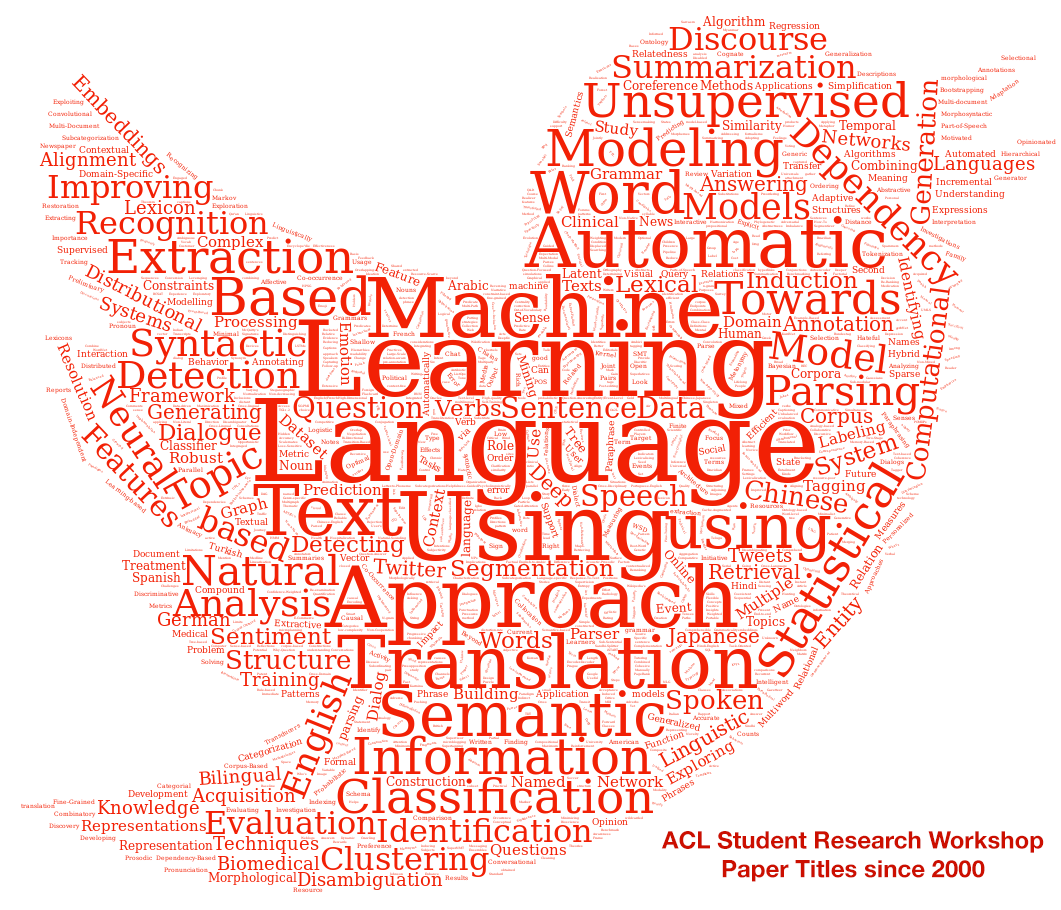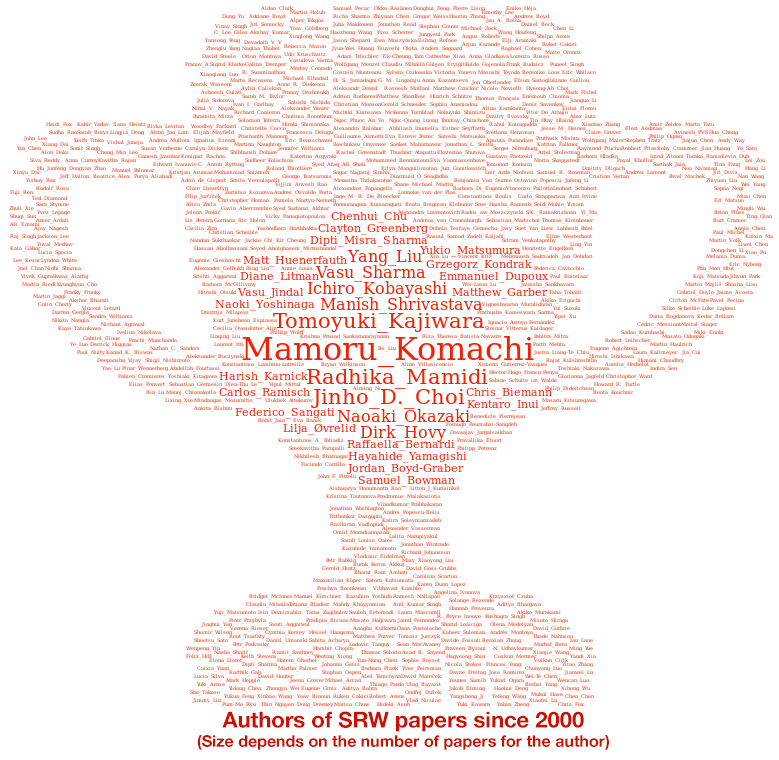Spotlight on the Student Research Workshop

One of the most popular sessions of *ACL conferences is the Student Research Workshop (SRW). ACL describes the aim of this session as allowing the students to take their first steps towards becoming a computational linguist. The larger CL community treats this session as a welcoming hub for the next generation of computational linguists.
We asked some current researchers in the field who had previously submitted to the SRW to share their experiences.
Dr. Mohammad Salameh, a Machine Learning Engineer at Diffbot shares how he started his journey in Computational Linguistics through the SRW in 2013:
My first paper in an ACL-related conference was “Reversing morphological tokenization in English-to-Arabic SMT”, which was submitted and accepted at the Student Research Workshop. I believe the submission was very successful, as it shaped the topic of my NLP research and thesis. I had a Skype conversation with my mentor afterward, and we discussed several ways of improving my work and the writing as he is an expert in Arabic NLP. I met him later in 2014 at the ACL conference, and he introduced me to several researchers working in my area. After finishing my Ph.D., I ended up as a postdoc working under my mentor’s supervision.
Dr. Salameh completed his PhD from the University of Alberta and later worked as a Postdoctoral Research Associate at the Carnegie Mellon University in Qatar.
His story is very recent. But how about this one from 15 years ago?
Dr. Naoki Yoshinaga, an Associate Professor at the University of Tokyo recalls when he presented his work at the ACL student session back in 2004 as a PhD student:
ACL-SRW used to be the ACL Student Session (part of ACL) but it becomes one of the ACL workshops more than 15 years ago. When I present one paper at ACL-SRW 2004, I could even have a chance to join a panel discussion on our research with senior researchers (Chris Brew and and Martha Palmer, if I remember correctly). It was an exceptionally great experience for me.
After 15 years, Dr. Yoshinaga strongly encourages his students to participate in the SRW:
I recommended my student to submit his paper to ACL-SRW 2017 (and it was fortunately accepted). He had a chance to present his ambitious paper on situation-aware neural chatbot in the same slot as the main paper poster sessions, and could get some good feedback from the main conference audience.
The following recollection is a from a student who presented her paper at SRW in 2005:
The very first ACL conference I attended was ACL 2005, in Michigan, Ann Arbor, where I presented a paper in the Student Research Workshop (SRW). I wasn’t aware of the SRW. But a few months before the submission deadline, Rada Mihalcea and Ted Pedersen suggested the SRW to me. They gave a tutorial at IBERAMIA 2004, the venue was my graduate school: The National Institute of Astrophysics, Optics and Electronics. It was thanks to them, and to the sponsorship provided by the ACL organization that I was able to attend, and I remain to this day, very grateful for that opportunity.
Many years later, this student is not only still a part of the CL community, but she is actually serving as a program co-chair of this conference! Dr. Thamar Solorio, who is now an Associate Professor at the University of Houston further adds:
Attending ACL 2005 had a long lasting impact on my career path. Before attending ACL that year, I’ve presented a paper at COLING in 2004, and another one at CICLing 2004, but for some reason it was until I attended ACL that year that it became clear to me that I wanted to be part of the *CL community. I was energized by the work presented there, and by meeting so many great researchers. Almost 15 years later, I’m still part of this great community that continues to grow every year.
At the same session in 2005, Dr. Kevin Duh, who is currently a Senior Research Scientist at the Johns Hopkins University Human Language Technology Center of Excellence (HLTCOE), also presented a paper. He shares the following inspiring story:
I have fond memories of SRW. I submitted one of my class projects to SRW when I was in the beginning of my graduate school career. It was an opportunity for me to write the entire paper by myself, without relying on my PhD advisor’s assistance. This was a very good learning experience. It made me appreciate how much goes in to a research paper – starting with motivation, idea, experimental design, implementation, and finally a presentation that tells a story. My paper was on using Factorial HMMs to do joint POS and NER tagging, and it was quite a confidence booster to discover later that some folks in the community have read it!
For new students, he adds:
I would encourage starting students to submit to SRW by yourself (but only do so once, and do not rely on your advisor too much); after that, shoot for *ACL and EMNLP!
The NLP community has grown by leaps and bounds and participation in the student research workshop is also growing. The following plot shows the number of papers accepted at the SRW Since 2000.

The list of topics of the papers accepted in the SRW is also interesting. According to Prof. Yoshinaga:
ACL-SRW papers are sometimes more exciting than ACL ones. ACL-SRW can accept ongoing research with new or unconventional goals or approaches … The accepted papers are some times more exciting to me.
For purposes of illustration, here are some wordclouds made of the paper titles from the SRW in various years.





As with everything, there are also issues and problems. For example, Dr. Salameh mentions:
Unfortunately, I was not able to attend the conference as I did not get the visa to the USA on time (got it 2 months after the end of the conference). Nevertheless, this did not stop me from presenting it to the mentor by recording it.
Thamar Solorio adds:
It turns out that the mentor assigned to provide expert feedback on my research didn’t show up. My SRW mentor got stuck at the business meeting. Lucky for me, Mona Diab was a mentor assigned to the other presenter in my session, and she graciously saved the day by providing on-the-spot feedback for me. To this day, I’m a great fan of her and her work.
She continues:
I truly believe that the SRW is a great channel to nurture young researchers, and it is especially beneficial to motivated graduate students coming from regions underrepresented at *CL conferences, where graduate advisors might, understandably, focus on meeting standards for a promotion system that does not value these conferences, and where travel budgets are prohibitively low. The SRW, provides the means for travel, but also the means for newcomers to create a community of peers, a unique networking opportunity. I hope ACL and NAACL keep the SRW going for years to come. Wishing SRW participants a great experience this year!
We expect that the NLP/CL community will heartily welcome more awesome new researchers at this year’s SRW. Please follow us at our 2019 websites for the NAACL-SRW and for ACL-SRW to stay up-to-date.
Our deepest thanks to all of the SRW champions over the years - all of the organizers, authors, and participants for bearing the torch!

We want to thank all of the researchers who took the time to share their experiences with us for this blog post.
Leave a comment